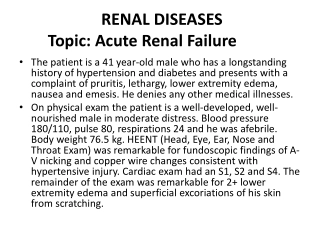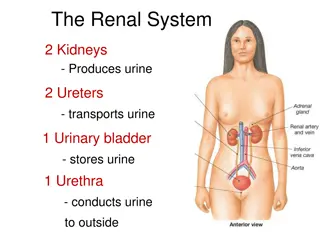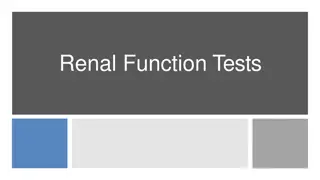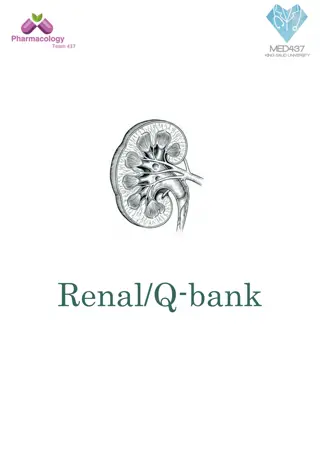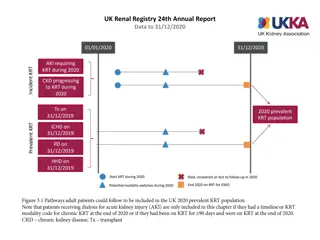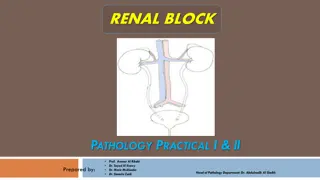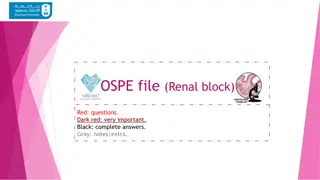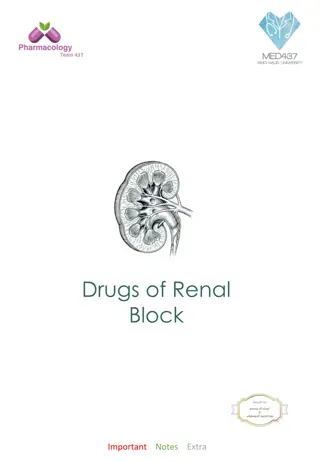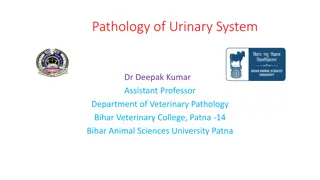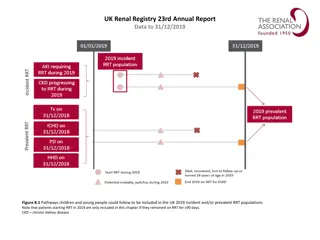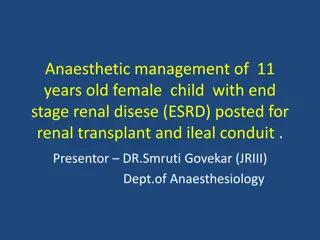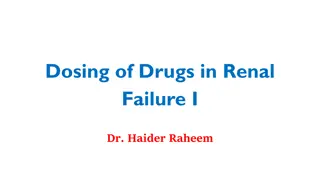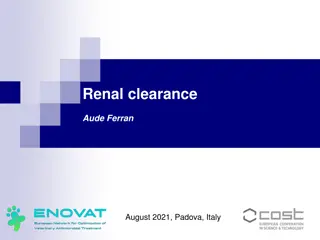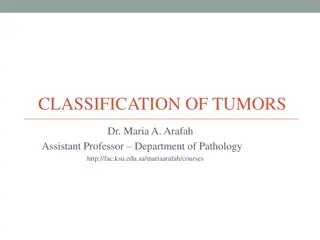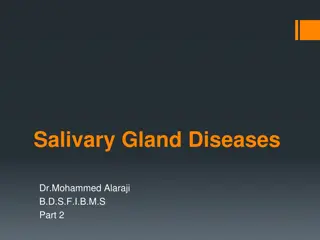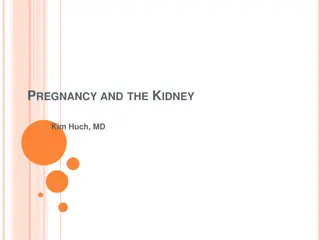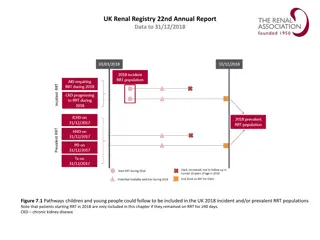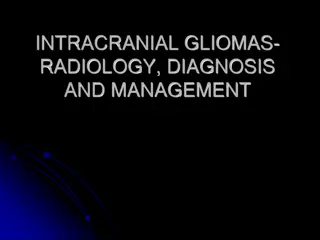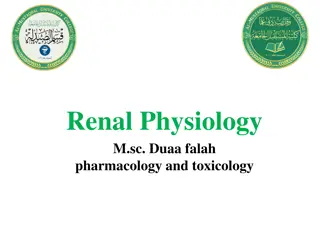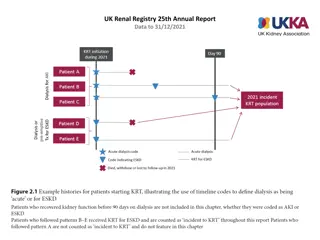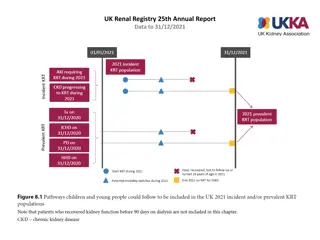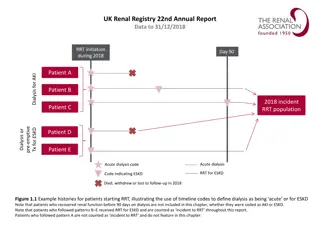RENAL DISEASES - Topic: Acute Renal Failure
Discusses a case of acute renal failure in a 41-year-old male with a history of hypertension and diabetes. It covers the patient's symptoms, laboratory data, and possible causes.
1 views • 14 slides
Abbott Nepro LP Powder Optimal Renal Nutrition for Individuals
Abbott Nepro LP Powder Vanilla Toffe - Complete Renal Nutrition Carb Steady Lower Protein (400 GMS) For People With Kidney Disease (Non-DIALYZED)\n\nEssential Support: Abbott Nepro LP Powder For Renal Nutrition\n\nExperience Essential Support For Individuals With Kidney Disease Through Abbott Nepro
1 views • 4 slides
Abbott Nepro LP Powder Optimal Renal Nutrition for Individuals
Essential Support: Abbott Nepro LP Powder For Renal Nutrition\nExperience Essential Support For Individuals With Kidney Disease Through Abbott Nepro LP Powder. This Vanilla Toffee Variant Is Designed To Provide Complete Renal Nutrition, Ensuring That Those With Specific Dietary Requirements Receive
1 views • 4 slides
Understanding Tumor Classification and Nomenclature in Pathology
This slideshow provides an overview of tumor classification, nomenclature, and key concepts in pathology. It covers the definitions of neoplasm, tumor, and oncology, the classification of tumors into benign and malignant categories, as well as the importance of stroma in tumor behavior. It also expl
4 views • 61 slides
Radiology Imaging Modalities for Renal System Evaluation
Various radiology modalities such as Ultrasound, X-Ray, MRI, CT, and Nuclear Scans are used to assess the renal system. Each modality has its advantages and disadvantages, with Ultrasound and MRI being radiation-free options, and Nuclear Scans providing functional assessment. Understanding the key f
6 views • 24 slides
Antibiotic Adaptation in Renal Insufficiency - Dosage Adjustments and Risks
Understanding the importance of adapting antibiotic therapy in patients with renal insufficiency is crucial to ensure efficacy and minimize risks. This content covers various factors influencing antibiotic selection, dosing adjustments based on patient parameters, and the risks associated with inapp
0 views • 52 slides
An Overview of the Renal System and Nephron Anatomy
The renal system consists of the kidneys, ureters, urinary bladder, and urethra, responsible for producing, transporting, storing, and excreting urine. The kidneys are surrounded by three layers, and the nephron is the functional unit responsible for filtering blood and producing urine. Key componen
4 views • 26 slides
Understanding Renal Function Tests: Lecture Insights on Kidney Function and Structure
This lecture delves into the essential aspects of renal function tests, exploring the functional units of the kidney, the role of nephrons in maintaining homeostasis, and the intricate processes of filtration, reabsorption, and secretion within the renal tubules. Key topics include the hormonal and
4 views • 17 slides
neurosurgeon in jaipur-Dr Himanshu Gupta
brain tumor is an abnormal growth of cells in the brain. Tumors can be either cancerous (malignant) or non-cancerous (benign). Cancerous tumors grow and spread aggressively, potentially invading nearby tissues and spreading to other parts of the body, while non-cancerous tumors are usually less aggr
0 views • 5 slides
Understanding Testicular Tumors: Types, Classification, and Clinical Findings
Testicular tumors are predominantly malignant, with germ cell tumors being the most common type. This article delves into the classification of testicular tumors, including primary and secondary, benign and malignant, germ cell, and non-germ cell tumors. Clinical findings such as painless enlargemen
3 views • 31 slides
Understanding Renal Function Tests and Kidney Health
Renal function tests are essential for diagnosing and monitoring kidney health. These tests assess functions like glomerular filtration, tubular reabsorption, and endocrine functions of the kidneys. Common indicators include serum urea, creatinine levels, and more. It's crucial to evaluate renal fun
0 views • 34 slides
Renal Pharmacology: Drug Excretion and Renal Clearance Questions
This comprehensive set of questions and answers covers topics related to drug excretion and renal pharmacology. It includes information on glomerular filtration, drug excretion mechanisms, dosage adjustments in renal impairment, factors influencing drug excretion, and the effects of long-term NSAID
0 views • 55 slides
UK Renal Registry 24th Annual Report Data Summary 2020
The UK Renal Registry's 24th Annual Report provides comprehensive data and insights on renal health in the UK up to 31st December 2020. The report covers various aspects such as patient outcomes, treatment trends, and demographic characteristics, highlighting the challenges and progress in the manag
4 views • 16 slides
Renal Block Pathology Practical: Anatomy and Histology Overview
The Renal Block Pathology Practical provides a comprehensive insight into the anatomy, structure, and histology of the kidney nephrons, including normal and abnormal conditions such as acute kidney injury. The session covers topics like the structure of the nephron, normal kidney gross anatomy, rena
3 views • 47 slides
Histology of the Renal System for OSPE Exam Preparation
This comprehensive OSPE file for renal block covers key structures of the kidney including the cortex, juxtaglomerular apparatus, renal corpuscle, and kidney medulla. It provides detailed identification of structures, labeling of components, and differentiation between tubules. Helpful images and de
0 views • 11 slides
Understanding Renal Block: Drugs, Excretion, and Treatment Essentials
Renal block plays a crucial role in drug excretion, with processes like glomerular filtration and tubular secretion affecting drug elimination. Factors like blood flow, physiochemical properties, and urine pH influence renal excretion of drugs. Competition between drugs for transporters can have ben
0 views • 10 slides
Anomalies of Kidneys and Factors Affecting Renal Function in Veterinary Pathology
An overview of anomalies affecting the kidneys in animals, including ectopic kidney location, renal agenesis, renal aplasia, and renal hypoplasia. The images illustrate anomalies such as fused kidneys and duplication of kidneys, with explanations of occurrence and sequelae. Additionally, factors aff
0 views • 13 slides
Understanding Gamma Knife Stereotactic Radiosurgery
The Gamma Knife Stereotactic Radiosurgery is a precise and effective treatment method where highly focused radiation beams are used to target tumors and abnormalities in the brain. It does not remove the tumor directly but affects DNA, cell growth, and blood vessels. The procedure involves three mai
0 views • 51 slides
UK Renal Registry 23rd Annual Report Data Summary 2019
The UK Renal Registry 23rd Annual Report Data for the year 2019 provides detailed insights into the pathways, modalities, and primary renal diseases affecting children and young people (<16 years old) requiring renal replacement therapy (RRT). The report includes figures on RRT modalities, compariso
0 views • 17 slides
Anaesthetic Management of 11-Year-Old Female with End-Stage Renal Disease (ESRD) for Renal Transplant and Ileal Conduit
An 11-year-old female child with end-stage renal disease (ESRD) and multiple surgical histories was evaluated for renal transplant and ileal conduit surgery. The patient presented with hypertension, chronic kidney disease, neurogenic bladder, and urinary incontinence. Preoperative assessments reveal
0 views • 22 slides
Ceftazidime Dosage Modification in Renal Failure Cases
Ceftazidime dosage adjustments are crucial in patients with renal impairment to prevent toxicity or suboptimal treatment. Factors like renal function, drug elimination route, and therapeutic window must be considered. Proper dosing ensures effective treatment while avoiding adverse effects in patien
0 views • 33 slides
Understanding Neuroendocrine Tumors: Endocrinology Insights
Delve into the complex world of neuroendocrine tumors (NETs) through a detailed presentation prepared by Dr. Thomas O'Dorisio from the University of Iowa. Explore case reports, therapeutic interventions, and the challenges associated with managing these tumors. Gain valuable insights into the functi
0 views • 24 slides
Understanding Renal Clearance and its Physiological Mechanisms
This content delves into the concept of renal clearance, exploring its relation to lipophilicity and mechanisms such as glomerular filtration, tubular secretion, and reabsorption. The processes occurring at the nephron level and the vascularization scheme are detailed, along with a breakdown of phys
0 views • 31 slides
Understanding Neoplasia: Characteristics and Nomenclature of Tumors
Neoplasia, or new growth, is characterized by uncoordinated growth exceeding that of normal tissues, persistent growth independent of stimuli, loss of responsiveness to growth controls, and local expansion regardless of host environment. Tumors are classified into benign and malignant categories in
0 views • 36 slides
Classification of Tumors: A Comprehensive Overview
Understanding the classification of tumors is crucial in the field of pathology. This detailed overview covers the definitions of neoplasia and tumors, the differentiation between benign and malignant tumors, nomenclature, and characteristics of various tumor types. It discusses the behaviors of ben
1 views • 34 slides
UK Renal Registry 24th Annual Report Data Summary 2020
The UK Renal Registry 24th Annual Report Data provides comprehensive insights into renal health and patient outcomes up to 31/12/2020. The report covers a wide range of data including treatment trends, patient demographics, transplant outcomes, and more. It serves as a valuable resource for healthca
0 views • 16 slides
Lancashire Teaching Hospitals Renal Transplant Services Overview
Lancashire Teaching Hospitals' Renal Transplant Services led by Sr. Fiona Biggins and Dr. Aimun Ahmed serve a population of 1.6 million, with key areas of focus including living kidney donation, renal services across Lancashire and South Cumbria, quality improvement initiatives, and lean improvement
1 views • 13 slides
Epidemiology and Pathology of Brain Tumors - Overview and Incidence Statistics
This information provides an in-depth overview of the epidemiology, classification, and pathology of brain tumors. It covers the relative incidence of various brain tumors, including astrocytoma, glioblastoma, meningioma, and others. The data also includes statistics on the occurrence of brain tumor
0 views • 98 slides
Overview of Salivary Gland Tumors and Diseases
Salivary gland diseases, including tumors, can affect both major and minor glands. These tumors may be benign or malignant, with common benign tumors like pleomorphic adenoma. Clinical features of salivary gland tumors vary, with slow-growing benign tumors being more common. Pleomorphic adenoma is p
0 views • 27 slides
Renal Function Monitoring in the PROUD Study: Truvada Pre-Exposure Prophylaxis Trial
Renal function in the PROUD study, a pragmatic open-label randomized trial of Truvada as pre-exposure prophylaxis, was monitored closely. No significant safety concerns were found, with similar renal adverse events between the placebo and Truvada groups. Regular monitoring included baseline serum cr
0 views • 16 slides
UK Renal Registry 24th Annual Report Data Summary 2020
The UK Renal Registry's 24th Annual Report provides comprehensive data and analysis up to 31st December 2020, covering various aspects related to renal health in the UK. The report highlights key findings, trends, and outcomes in renal care, including information on treatments, patient demographics,
0 views • 13 slides
Overview of Renal Tumors: Benign and Malignant Forms
Explore the spectrum of renal tumors, from benign papillary adenomas and oncocytomas to malignant renal cell carcinomas like clear cell carcinoma. Images and descriptions showcase the gross pathology and histopathology of these tumors. Learn about the features and prognosis of different renal tumor
0 views • 31 slides
Pregnancy and the Kidney: Physiological Changes and Considerations for Chronic Kidney Disease
GB, a 28-year-old woman with a history of FSGS, seeks advice on pregnancy. Physiological changes in pregnancy affect renal function, including increased renal flow and volume, ureteral dilation, and systemic vasodilation. Renal hemodynamics peak in the first trimester without causing kidney damage.
0 views • 36 slides
UK Renal Registry 22nd Annual Report Data (2018): Pediatric Renal Disease Insights
The UK Renal Registry's 22nd Annual Report presents detailed data on pathways and modalities for pediatric patients with chronic kidney disease. Figures from the report highlight the start of renal replacement therapy (RRT), prevalent RRT modalities, primary renal diseases, z-scores for height, and
0 views • 17 slides
Intracranial Gliomas: Radiology, Diagnosis, and Management Overview
This comprehensive overview covers the classification, subtypes, and spatial definitions of intracranial gliomas, including astrocytic tumors, oligodendrogliomas, ependymal tumors, neuronal tumors, pineal tumors, and embryonal tumors. It also discusses low-grade gliomas and spatial definitions based
0 views • 38 slides
Understanding Renal Physiology and Functions
This content covers the aims of studying renal physiology, functions of the kidney, basic renal processes, renal secretion, urine formation, and types of renal failure. It delves into topics such as water balance, electrolyte balance, urine production, and the components of the urinary system. The i
0 views • 10 slides
UK Renal Registry 25th Annual Report Data Summary
The UK Renal Registry's 25th Annual Report Data up to 31/12/2021 provides valuable insights into renal health statistics and trends in the UK. The report covers various aspects of renal care, including patient outcomes, treatment modalities, and demographic information. It serves as a comprehensive
0 views • 25 slides
UK Renal Registry 25th Annual Report Data Summary for 2021
The UK Renal Registry's 25th Annual Report provides comprehensive data and insights on renal health up to 31st December 2021. The report covers various aspects such as prevalence, incidence, treatment modalities, and outcomes related to renal diseases in the UK population. It offers valuable informa
0 views • 16 slides
UK Renal Registry 22nd Annual Report Data (2018)
The UK Renal Registry's 22nd Annual Report Data to 31/12/2018 provides detailed insights into various aspects of renal replacement therapy (RRT) initiation, incidence rates, primary renal diseases, RRT modalities, and more. The report includes figures illustrating RRT initiation patterns, adult RRT
0 views • 32 slides
Symptomatic Control of Functioning Pancreatic NET
Pancreatic neuroendocrine tumors (panNETs) can be classified as functioning or non-functioning, with functioning tumors producing active hormones such as insulin, glucagon, gastrin, or VIP. Symptomatic control is crucial for managing these tumors, with diagnoses based on clinical syndromes and hormo
0 views • 19 slides
